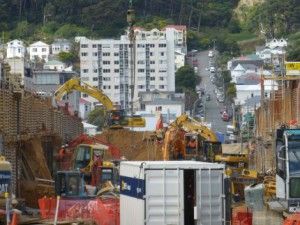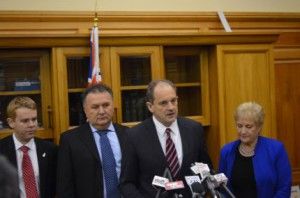Media / August 2013
September 2013 | July 2013-
-
Social Justice Week 2013: Unemployment – the local face of a global concern
- Welcom
- Social Justice Week, 8-14 September, 2013 September 2013 Unemployment affects everyone, particularly young people whose ability to find work has been hindered by the loss of jobs after the 2009 economic recession. Four years on, youth unemployment remains high throughout the world. In New Zealand, 75,000 Kiwis agead 15-24 are not in employment, education or training. For young people on the margins, the repercussions of long-term unemployment can be scarring. Each year New Zealand’s Catholic Bishops use Social Justice Week to consider Catholic social teaching on a specific social justice issue relevant to our society. This year the focus for 8 to 14 September is on ‘meaningful work for the young worker’. Caritas Aotearoa New Zealand has provided resources for Catholic parishes, schools and the wider community. The core booklet Walk Alongside: Meaningful work for the young worker helps us to consider what it is like to be a young worker today and the difficulties young people face as they look for stable work. The bishops also challenge individuals and communities to consider how they can accompany or ‘walk alongside’ the young people around them. Other resources include posters, prayer cards and liturgical resources, as well as a special website on the issue. Now more than ever, young people need the encouragement of their wider community and of the church. The local face of a global concern On his way to World Youth Day last month, Pope Francis talked with journalists about his concern for the impact of the economic recession on young unemployed people. In New Zealand, one in six young people looking for work cannot find a job. This is a concern for the whole community. Work that is meaningful enhances human dignity. It gives people enough to live on and leads to lifelong, secure employment. New Zealand’s labour market has been slow to recover from the economic recession and the number of jobs available is still below pre-recession levels. Young people are often at the end of long job queues. New entry jobs for young graduates are few. A baby blip in the early 1990s means there are now 42,000 more people aged 20 to 25 entering the labour force than five years ago. Fact – 42 percent of all casual workers are aged 15 to 24. Young people tend to work in casual employment with no fixed hours or job security. These jobs tend to be the first to go in times of financial hardship. Many tertiary graduates are struggling to find work in their field of study. In 2012, the Ministry of Education told Victoria University primary teaching students that only a fifth of graduates would find work within a year of graduating. A recent graduate, Nicole Jenness, has applied for more than 60 teaching roles and, after 10 months of searching, has yet to find a teaching job. Pope Francis has said, ‘We have all become accustomed to this disposable culture... With all the young people out of work, even they are affected by a culture in which everything is disposable.’ Government responses such as the Starting-Out Wage and the 90-day probationary period continue to reinforce a disposable culture where young people may be seen as a source of cheap labour and deprived of a just wage. Economic recessions come and go, but the impact of insecure work and unemployment on young people and our community can be long lasting. For young people on the margins, job insecurity and unemployment further pushes them towards disengagement because they miss out on a sense of belonging in society. Reflecting the sentiment of Pope Francis we, as a community, are called to walk together towards a culture of inclusion where the skills and contribution of everyone can be recognised and realised.
- Accepted from Archdiocese of Wellington - Wel-com articles
- Automatically tagged as:
- catholic
- media
-
-
-
Social Justice Week 2013: Youth wage far from a just wage
- Welcom
- Social Justice Week, 8-14 September, 2013 September 2013 Earlier this year, the government reintroduced a youth minimum wage called the Starting-Out Wage. This allows employers to pay young workers 80 percent of the adult minimum wage during their first six months on the job. The Starting-Out Wage can apply to all 16- and 17-year-olds, and to 18- and 19-year-olds if they have been on the unemployment benefit for more than six months. Economically there are conflicting arguments about whether this policy helps to create more jobs and if it truly benefits young unemployed people. Regardless, the Starting-Out Wage makes a sweeping assumption that young people do not need a wage that meets their basic living expenses. It assumes that the work of a young person is worth less than the same work of an older person. The Catechism of the Catholic Church states ‘a just wage is the legitimate fruit of work’. A just wage should be able to meet a worker’s basic living costs (#2434). Caritas told the select committee considering the Starting-Out Wage legislation that young people contribute their income towards wider family costs, as well as to personal costs of living and study. For some young people dependent on public transport, simply getting to work is costly.
- Accepted from Archdiocese of Wellington - Wel-com articles
- Automatically tagged as:
- catholic
- media
-
-
-
Social Justice Week 2013: Don't give up – bishops
- Welcom
- Social Justice Week, 8-14 September, 2013 September 2013 New Zealand’s Catholic Bishops warn that young unemployed people may face decades of disadvantage. Introducing the Social Justice Week booklet, they write, ‘To young people experiencing difficulties in finding permanent, secure work, we say, "Do not give up hope.... Each of you is a precious and valued member of our society. We are not giving up on you – please don’t give up on yourself". ‘To employers, we say, "Do not give in to stereotypes that young people may be unreliable or unmotivated. Employers tell us that often their youngest employees exceed their expectations. Make a commitment to give reliable and secure work to your young workers and expect loyalty and commitment in return. ... ‘To our parishes and the wider community, we say, "Get to know the young people in your community who are looking for work. Talk to them about your experiences of work and support them in their job search." ... ‘In Social Justice Week this year, it would be great if we all make an effort to talk to those around us about our experiences of work and of looking for work. We may all be surprised at what we learn from one other and how we can help one another.’
- Accepted from Archdiocese of Wellington - Wel-com articles
- Automatically tagged as:
- catholic
- media
-
-
-
Social Justice Week 2013: Resources for schools
- Welcom
- Social Justice Week, 8-14 September, 2013 September 2013 Catholic schools’ resources focus on the nature of work as an important part of life. The teacher’s booklet Justice at Work draws on key ideas from the core Social Justice Week booklet Walk Alongside, adapting them for a younger readership. Learning is underpinned by the enduring understanding of how God works in our lives to make us more Christ-like. We are in God’s creative and loving hands. Primary school materials explore the meaning of work, why people work, and different kinds of work. Older students (Years 7-13) are encouraged to research and engage in topics such as workers’ rights and responsibilities, and using our gifts in working towards the Reign of God. The schools poster sent out this year doubles as a board game, using commonly heard phrases by those seeking work. It aims to encourage conversations about the uncertain future of work for many young people. These conversations are important as preparation for the challenges ahead. Prayers, liturgy and worksheets are available for downloading from the Caritas website. School visits are planned for September.
- Accepted from Archdiocese of Wellington - Wel-com articles
- Automatically tagged as:
- catholic
- media
-
-
-
Fr Dennis Nacorda ordained
- Welcom
- Archdiocesan News September 2013 The chapel at St Patrick's College Silverstream was packed on Saturday afternoon 10 August when Fr Dennis Nacorda started his priestly ministry. Archbishop John Dew ordained Fr Dennis for the Archdiocese of Wellington. Quoting Pope Francis at World Youth Day in Brazil in July, Archbishop John invited Fr Dennis to 'Warm the hearts of God's people' with his ministry. Pope Francis had asked the bishops gathered in Rio, 'Can the Church today still "warm the hearts" of its faithful with priests who take the time to listen to their problems?' ... 'We must train ministers capable of warming people’s hearts, of walking with them in the night, of dialoguing with their hopes and disappointments, of mending their brokenness.' Archbishop John said 'Dennis, if you make it your life’s task to “warm the hearts” of God’s people, you will be doing what Jesus asks you to do as his priest and what the church expects of you. 'Those tasks can clearly be done only by “being with” God’s people. 'Just as Jeremiah the Prophet was called, so you are called, too, and the Lord also says to you, “Go now to those to whom I send you. Do not be afraid, for I am with you to protect you.”' Earlier Archbishop John asked Fr Dennis whether he was 'resolved with the help of the Holy Spirit to discharge without fail the office of priesthood as a conscientious fellow worker with the bishops in caring for the Lord’s flock. 'Are you resolved to celebrate the mysteries of Christ faithfully and religiously for the glory of God and the sanctification of Christ’s people? 'Are you resolved to exercise the ministry of the word worthily and wisely, preaching the Gospel and explaining the Catholic faith? 'Are you resolved to consecrate your life to God for the salvation of his people, and to unite yourself more closely everyday to Christ the High Priest….?' Such questions are part of every ordination ceremony. 'We priests are privileged to do that'. In speaking about Fr Dennis consecrating his life to God, Archbishop John told Fr Dennis he could be of help to God’s people only by uniting himself more closely to Jesus every day. 'Dennis, know that God is always with you and has chosen you for this. 'Think of those questions and as you prepare to answer them do so in the context of “warming hearts”. 'It’s a wonderful expression and says so much more than doing priestly tasks. It’s about getting out there and being with people.' You will 'warm hearts' by, 'discharging without fail the office of priesthood by caring for the Lord’s flock. 'This means being with people in their homes, where they socialise and re-create – we respond to every opportunity to be with parishioners even if we don’t always feel like it. 'You will also “warm hearts” by “celebrating the mysteries of Christ faithfully and religiously for the glory of God and the sanctification of Christ’s people”. 'When you exercise the ministry of the word worthily and wisely, when you preach the Gospel and explain the Catholic faith you will touch hearts. Your love and kindness, your compassion and listening ears will be the way to show people you are interested and care for them…that our priesthood is about them and not about us.' Archbishop John advised Fr Dennis to listen often to the advice in one of the scripture passages he had chosen for his ordination ceremony, the letter to the Ephesians. 'Be on your guard for yourselves and for all the flock of which the Holy Spirit has made you the overseer, to feed the Church…. 'Now I commend you to God and to the word of his grace that has the power to build you up. 'Today, we are delighted to commend your priestly ministry to God and his grace, which has the power to build you up,' Archbishop John said. 'Remember, too, that there will be challenges, but listen often to the words of Jesus “Peace be with you". He also says to you “As the Father sent me, so am I sending you".' Fr Dennis will remain in Heretaunga and Stokes Valley until the end of the year.
- Accepted from Archdiocese of Wellington - Wel-com articles
- Tagged as:
- stokes-valley
Stokes Valley, Lower Hutt, Lower Hutt City, Wellington, 5019, New Zealand (OpenStreetMap)
-
-
-
Archbishop’s column: Facing a future full of hope
- Welcom
- Opinion Archbishop John Dew September 2013 Since early May many, if not most, people in the archdiocese have responded to my invitation to discuss the future of the archdiocese. I am grateful to all parishioners, lay pastoral leaders and clergy who have generously given their energy to reimagining the archdiocese in a consultation process using the document A Future Full of Hope. Submissions from pastoral areas and parishes were due at the end of last month, after Wel-Com went to print. I do not know what has been proposed yet, but from what I have heard, I am thrilled that so many people have seen this consultation as an opportunity to grasp a new understanding of the mission of the Church. People have seized this chance to ask questions that enable each parish community to dream of a new and vital Church, to embrace new opportunities to evangelise and re-evangelise, to re-commit themselves to realising the kingdom of God more fully. They have talked about the diocesan commitment to the fact that we are God’s priestly people who share a responsibility to witness to God’s unfailing love and to bring Christ’s healing presence into our needy world. Change is unsettling under any circumstances, but even more so when it affects our faith and spiritual home, the parish. I sometimes wish that we did not have to ask these hard questions and make such changes.But, as I looked across the archdiocese, I could see that some change was inevitable and we needed to start now, for all the reasons you know: limited financial resources huge insurance premiums the uncertain future of some parish buildings, and fewer clergy. If we approach planning and change from a negative standpoint, our proposed solutions could be reactive and focused on the present, whereas approaching the future based on faith, vision and mission will reveal wonderful new possibilities. As together we face both opportunities and challenges, we are asked to be open to the spirit of God. It is not easy for the spirit to work with illusion and elusion, but God revels in reality. Cardinal John Henry Newman once said, ‘In a higher world it is otherwise, but here, to live is to change, to be perfect is to have changed often.’ Therefore, as we look at our, as yet uncertain future, let us remember that God is with us. As Jesus said in John 14: ‘Do not let your hearts be troubled, trust in God still and trust in me’. Our reality is that we are the people of God who, through baptism, are called to be Church, to witness to the presence of Jesus in our midst and to live the radical call to discipleship that the gospel demands. Therefore ask yourself the question: What do I need to do today to create the condition for the possibility of belief and witness for myself and for those who will come after me? Remember, we face a future full of hope. Be not afraid.
- Accepted from Archdiocese of Wellington - Wel-com articles
- Tagged as:
- consultation
-
-
-
Palmerston North's Year of Faith Mass
- Welcom
- Palmerston North Cecily McNeill September 2013 Imagination is key to growth in the diocese and to people becoming what God wants us to be, Bishop Charles Drennan told the more than 2,000 people gathered for a Year of Faith Mass in Palmerston North’s Pascal St Stadium on 4 August. ‘Satisfaction with stagnation is a death wish; the opposite of love… [but] if we pray, if we hope, if we expect, if we work and if we shepherd for growth it will come. And by growth I mean a deepening of our faith and also, today, I want to say let’s grow in numbers, too.’ The imagination, he said, leads us into the reality of how God wants us to be. ‘Imagination releases our creativity, liberates us from bureaucracy and sameness, transforms obstacles into challenges, lethargy into energy, laziness into passion, and allows us to experience afresh, through the sometimes worn out symptoms of Christianity, the living reality of God himself.’ We were people of hope, he said. ‘The Spirit was God’s imagination at work which she experiences as play, crafting his world, carving us, reworking us, into characters ready to play out a new page of God’s unfolding story for our world.’ Visiting in the diocese, Bishop Charles said he met people who dared ‘to imagine new outcomes, to embrace new initiatives, to imagine an even deeper faith, shaping every aspect of their person, their life’. Turning to the 50 candidates for Confirmation, he read a letter from one explaining their wish for the sacrament. ‘…to announce myself in front of my Catholic Community is something I am proud to do for it is part of my hikoi tapu – sacred journey – to God. I have always enjoyed seeing and participating in the Eucharist because of the unity I sense when everyone partakes of the body and blood of Hehu Karaiti. With his own body and blood he forgives me and draws me closer to himself, and to his teachings. I am in my final year at College. I am now ready. It is fitting that I be confirmed so that I establish myself as an adult in my religion of Catholicism katorikatanga. ‘Confirmation candidates, today the Holy Spirit comes to you bearing seven extraordinary gifts that will shape you for the rest of your life: wisdom, understanding, right judgement, courage, knowledge, reverence, and awe. These gifts are not skills or talents or achievements. They are extraordinary because they are nothing less than God’s own life, God’s way of being, placed by the Holy Spirit in you. ‘And those seven divine gifts once opened and lived, grow within us into what we call the 12 fruits of the Holy Spirit: charity, joy, peace, patience, kindness, goodness, generosity, gentleness, faithfulness, modesty, self-control and chastity. Shaped by these gifts and fruits you will become the true you, the real you, the you of your soaring imagination, your highest aspirations, your greatest dreams. ‘With your sponsors and whanau we all say thank you for your courage to step up and embrace our shared life of faith. ‘Inspired by today’s great liturgy, great sacrament and great festival of faith may we all be deepened in our faith, and experience more joyfully the great workings of God within us. ‘Accompanied by our forebears in faith and all the Saints may we bring hope and renewed purpose to our family members, our schools and our communities both Church and civic of Manawatu and Tararua.’
- Accepted from Archdiocese of Wellington - Wel-com articles
- Automatically tagged as:
- catholic
- media
-
-
-
Quake survivors count blessings and God's guardians
- Welcom
- News Cecily McNeill September 2013 One parishioner in the tiny town of Ward near the epicentre of last month’s 6.6 earthquake is planning to teach her grandchildren about their guardian angels because she says someone was certainly looking after them. Mary Hickman who, with husband Ossie, and their three sons form the nucleus with the West family of the parish in Ward, says they are all counting their blessings. Her husband, who is disabled, was lying on the bed alone in their brick house when the quake struck at 2.31pm on Friday 16 August. He said it was like being in a very violent storm at sea. ‘Things were ‘flying off the walls’ during the violent and prolonged shaking ‘but he wasn’t hit,’ she said. When the shaking stopped he managed to get himself into the nearby sitting room to wait for one of the sons to help him to safety. All the families gathered away from the houses and power lines until the first of the numerous aftershocks had subsided and one of Mary’s sons, whose wooden house needs its chimney demolished, has moved his family with four children to temporary accommodation in Blenheim. She and Ossie moved to a motel. Another branch of the family most of whom farm between Grassmere and Ward have sustained ‘massive damage’. ‘One of their homes, a brick house, is red-stickered (uninhabitable).’ Mary says the experience has been numbing. ‘You know you have to manage but it’s one day at a time.’ And as for those guardian angels, ‘it’s a good opportunity to learn that God has special people he sends to take care of us’, says Mary. Meanwhile, the quake has also rendered the town’s Catholic Church unsafe. The top third of the bricks on the steeple of the church, which celebrated 75 years recently, have loosened. The tower is over the entrance to the church. Scientists say last month’s quakes came from a fault line lying under Lake Grassmere about 40 kilometres south of Blenheim whereas the July shocks were centred more in Cook Strait. The more than 3,500 aftershocks since the 5.7 on 19 July have given seismologists a clearer idea of the larger fault system, the Dominion Post reported on 20 August. It appears seismic activity is moving away from Wellington. GNS geoscientist Bill Fry said it was more important to think in terms of a seismic network. ‘There are a lot of faults in the upper South Island that could potentially give rise to earthquakes,’ he told the Dominion Post. And the archdiocese is still awaiting confirmation of the extent of minor damage to others of its buildings in the wider region. Structural engineers have inspected the Catholic Centre and other archdiocesan workplaces and say the damage appears from initial assessment to be cosmetic. Director of Archdiocesan Support Services David Mullin is asking parishes to look for any signs of damage to assess the need for an engineer's inspection. These earthquakes are a timely reminder of the need to do what we can to improve the strength of buildings for people’s safety and confidence.
- Accepted from Archdiocese of Wellington - Wel-com articles
- Automatically tagged as:
- catholic
- media
-
-
-
Social Justice Week 2013: Ka'isa's story
- Welcom
- Social Justice Week, 8-14 September, 2013 September 2013 One of my first jobs was cleaning in a home for the elderly. There was a strong union presence. I didn’t think much of [the union] and didn’t see the point of joining at the time. The home for the elderly was a pleasant place to work. I took all of this for granted. In my second job at a hotel, I found we were not given the cleaning products and tools we needed to do our job properly. My hours were constantly changed without notice. I felt as if I was doing my job to the best of my ability, but every day the manager would tell me off or put me down. I didn’t want to question the boss even though I knew he was wrong. My fellow workmates felt the same as me. I was the youngest employee, so to see my older workmates just as scared as I was made me feel insecure. At my uncle’s suggestion, I joined the Service and Food Workers Union and became involved. My experience at the hotel improved and I felt more confident being able to give advice to and support my workmates. The manager continued to put me down every day saying I was lazy and useless – until I handed in my resignation after two years when he told me I was his best worker and asked me to stay to train new staff! So few young people are involved in unions because there is currently not much awareness or education about what unions can offer ... I see the main point of unions as creating and upholding the dignity of workers in their jobs. Ka’isa Beech is currently a student at Victoria University studying for a degree in Public Policy and Music while working part time. She is a member of the Justice, Peace and Development Commission in the Wellington Archdiocese.
- Accepted from Archdiocese of Wellington - Wel-com articles
- Automatically tagged as:
- catholic
- media
-
-
-
Social Justice Week 2013: Resources for schools (2)
- Welcom
- Social Justice Week, 8-14 September, 2013 September 2013 Catholic schools’ resources focus on the nature of work as an important part of life. The teacher’s booklet Justice at Work draws on key ideas from the core Social Justice Week booklet Walk Alongside, adapting them for a younger readership. Learning is underpinned by the enduring understanding of how God works in our lives to make us more Christ-like. We are in God’s creative and loving hands. Primary school materials explore the meaning of work, why people work, and different kinds of work. Older students (Years 7-13) are encouraged to research and engage in topics such as workers’ rights and responsibilities, and using our gifts in working towards the Reign of God. The schools poster sent out this year doubles as a board game, using commonly heard phrases by those seeking work. It aims to encourage conversations about the uncertain future of work for many young people. These conversations are important as preparation for the challenges ahead. Prayers, liturgy and worksheets are available for downloading from the Caritas website. School visits are planned for September.
- Accepted from Archdiocese of Wellington - Wel-com articles
- Automatically tagged as:
- catholic
- media
-
-
-
Social Justice Week 2013: Resources for schools
- Welcom
- Social Justice Week, 8-14 September, 2013 September 2013 Catholic schools’ resources focus on the nature of work as an important part of life. The teacher’s booklet Justice at Work draws on key ideas from the core Social Justice Week booklet Walk Alongside, adapting them for a younger readership. Learning is underpinned by the enduring understanding of how God works in our lives to make us more Christ-like. We are in God’s creative and loving hands. Primary school materials explore the meaning of work, why people work, and different kinds of work. Older students (Years 7-13) are encouraged to research and engage in topics such as workers’ rights and responsibilities, and using our gifts in working towards the Reign of God. The schools poster sent out this year doubles as a board game, using commonly heard phrases by those seeking work. It aims to encourage conversations about the uncertain future of work for many young people. These conversations are important as preparation for the challenges ahead. Prayers, liturgy and worksheets are available for downloading from the Caritas website. School visits are planned for September.
- Accepted from Archdiocese of Wellington - Wel-com articles
- Automatically tagged as:
- catholic
- media
-
-
-
Social Justice Week 2013: A website on work
- Welcom
- Social Justice Week, 8-14 September, 2013 September 2013 Archbishop John Dew and Wellington Sister of Mercy Marcellin Wilson feature in a video of first job experiences on Caritas’ special website 'Meaningful work for the young worker'. Video and personal stories from workers of all ages and walks of life are designed to promote reflection on what constitutes meaningful work in today's environment. The website also features information on finding work, workers’ rights, and facts and policy about young people and employment. Find out more about the Starting-Out Wage. Does it help or hinder efforts to find work? Is it fair? What does the 90-day probationary period say about our society’s willingness to provide young people with stable, secure employment. Join us online, debate the issues and share your story. The website is updated regularly.
- Accepted from Archdiocese of Wellington - Wel-com articles
- Automatically tagged as:
- catholic
- media
-
-
-
Divided over the flyover
- Wellington Scoop
- The city council has voted in favour of a flyover at the Basin Reserve, in spite of the fact that the city continues to be deeply divided over the issue. The vote, by 7 to 6, is a disappointment for Mayor Celia Wade-Brown, who has argued against the flyover since she successfully campaigned for the mayoralty against the pro-flyover mayor Kerry Prendergast. It was a narrow win, and for a while the new council had a one-vote majority against the flyover. But then Andy Foster changed sides.
- Accepted from Wellington Scoop features
- Tagged as:
- wellington-city-council
- basin-reserve-flyover
Basin Reserve, Dufferin Street, Mount Victoria, Wellington, Wellington City, Wellington, 6021, New Zealand (OpenStreetMap)
-
-
-
They didn’t like it but they voted yes
- Wellington Scoop
- I wish I’d been at yesterday’s Regional Council meeting. I would like to have heard more about why two regional councillors voted to support the Basin Reserve flyover after explaining why they didn’t like it. The DomPost reports from the meeting about the reluctant “yes” votes from Judith Aitken and Chris Laidlaw.
- Accepted from Wellington Scoop features
- Tagged as:
- basin-reserve-flyover
Basin Reserve, Dufferin Street, Mount Victoria, Wellington, Wellington City, Wellington, 6021, New Zealand (OpenStreetMap)
-
-
-
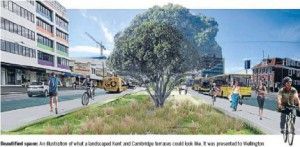
Replacing green space with green space
- Wellington Scoop
- You can’t help agreeing with Helene Ritchie. After reading a Wellington City Council document showing plans to create green space in the middle of Kent and Cambridge Terraces, she pointed out correctly that there’s already green space in this area.
- Accepted from Wellington Scoop features
- Tagged as:
- basin-reserve-flyover
Basin Reserve, Dufferin Street, Mount Victoria, Wellington, Wellington City, Wellington, 6021, New Zealand (OpenStreetMap)
-
-
-
Where are the cycleways?
- Wellington Scoop
- Though I’m only occasionally asked about it, I’m aware of an underlying question in the cycling community about “why isn’t there more evidence of progress for cycling under a ‘green’ mayor?” Questions are also occasionally asked about how this all fits with overall transport planning
- Accepted from Wellington Scoop features
- Tagged as:
- wellington-city-council
- cycling
-
-
-
Gospel Reflections: 21st in Ordinary Time C
- Welcom
- Reflection Veronica Lawson RSM Luke 13:22-30 We all know people or groups who seem to have an ingrained sense of entitlement or privilege, people who put themselves first without regard for the feelings or rights of others.
- Accepted from Archdiocese of Wellington - Wel-com articles
- Automatically tagged as:
- catholic
- media
-
-
-
Impossible dreams
- Wellington Scoop
- The news that Wellington Airport wants $200million of public money to pay for most of the cost of extending its runway seems to have relegated the proposal to the list of the city’s impossible dreams.
- Accepted from Wellington Scoop features
- Tagged as:
- runway-extension
-
-
-
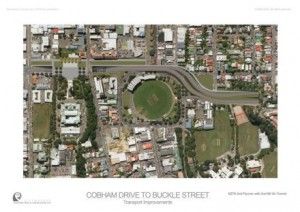
Inevitable? Why one Basin flyover will be followed by a second Basin flyover
- Wellington Scoop
- The NZ Transport Agency should come clean on its flyover plans. Our practice believes that one flyover will pave the way for a second. The Agency’s proposed options for mitigation of the flyover, which it has developed in agreement with the Wellington City Council, include a “commitment to consolidate state highway traffic away from Vivian Street and into a single east-west corridor.”
- Accepted from Wellington Scoop features
- Tagged as:
- basin-reserve-flyover
Basin Reserve, Dufferin Street, Mount Victoria, Wellington, Wellington City, Wellington, 6021, New Zealand (OpenStreetMap)
-
-
-

The two-faced flyover
- Wellington Scoop
- The flyover at the Basin Reserve will have two faces. The Basin Reserve face is too terrible to seen by cricketers, so it will be hidden by a new $12million building paid from roading funds. The other face won’t be hidden from anyone. Its ugliness will be seen by everyone else in the city, 24 hours a day, till the flyover is eventually demolished.
- Accepted from Wellington Scoop features
- Tagged as:
- basin-reserve-flyover
Basin Reserve, Dufferin Street, Mount Victoria, Wellington, Wellington City, Wellington, 6021, New Zealand (OpenStreetMap)
-
-
-
My forty film festival awards
- Wellington Scoop
- I’ve been going to the Wellington Film Festival for every one of its 42 years, even before it was rebranded as the NZ International Film Festival. So I’m claiming the right to offer my own personal festival awards.
- Accepted from Wellington Scoop features
- Tagged as:
- cinema
- events
-
-
-
Gospel Reflections: 20th Sunday in Ordinary Time C
- Welcom
- Reflection Veronica Lawson RSM Luke 12:49-53 Prophets can get a bad time, as today’s first reading from Jeremiah demonstrates (Jer 38:4-6, 8-10).
- Accepted from Archdiocese of Wellington - Wel-com articles
- Automatically tagged as:
- catholic
- media
-
-
-

Blown away by the flyover
- Wellington Scoop
- There’s a new addition to the list of bad things about the flyover that the Transport Agency wants to build alongside the Basin Reserve – motorbikes or light trucks could be blown over in strong winds while they’re on it, and there’ll be problems for pedestrians too.
- Accepted from Wellington Scoop features
- Tagged as:
- basin-reserve-flyover
Basin Reserve, Dufferin Street, Mount Victoria, Wellington, Wellington City, Wellington, 6021, New Zealand (OpenStreetMap)
-
-
-
The runway extension, petrol tankers, and Evans Bay’s unique marine life
- Wellington Scoop
- Plans to extend the runway at the northern end of Wellington Airport involve a tunnel under the extension – with consequences that the City Council and the Regional Council have not yet taken into account. It’s against the law for fuel tankers to travel through tunnels, and there’s already a tunnel at the southern end of the runway.
- Accepted from Wellington Scoop features
- Tagged as:
- runway-extension
-
-
-
Inequality: A New Zealand Crisis
- Welcom
- Feature: Inequality a New Zealand crisis August 2013 It's arrived at last! This much awaited New Zealand book was officially launched at the National Library on Thursday 27 June with much fanfare, enthusiasm and goodwill.
- Accepted from Archdiocese of Wellington - Wel-com articles
- Tagged as:
- libraries
-
-
-
Only the rich are getting richer
- Welcom
- Feature: Inequality a New Zealand crisis Cecily McNeill August 2013 Wealth has continued to be concentrated in the top one percent of incomes in Anglo-American countries despite the recession of 2007, says London School of Economics professor of political economy Robert Wade.
- Accepted from Archdiocese of Wellington - Wel-com articles
- Automatically tagged as:
- catholic
- media
-
-
-
Skills mismatch creates income gap
- Welcom
- Feature: Inequality a New Zealand crisis Cecily McNeill August 2013 A skills mismatch is contributing significantly to New Zealand’s inequality crisis, says Lincoln University professor of economics Paul Dalziel.
- Accepted from Archdiocese of Wellington - Wel-com articles
- Automatically tagged as:
- catholic
- media
-
-
-
Benefit cuts 'make no sense'
- Welcom
- Feature: Inequality a New Zealand crisis Cecily McNeill August 2013 Associate professor at the University of Auckland, Mike O’Brien, says welfare cuts that took effect last month make no sense.
- Accepted from Archdiocese of Wellington - Wel-com articles
- Automatically tagged as:
- catholic
- media
-
-
-
Archbishop’s column: Shaped by God's word daily
- Welcom
- Opinion Archbishop John Dew August 2013 'Each of you should be shaped by God’s word every day.
- Accepted from Archdiocese of Wellington - Wel-com articles
- Automatically tagged as:
- catholic
- media
-
-
-
Quake too much for Seddon crucifix
- Welcom
- News Cecily McNeill Mass became rapidly more dramatic for parishioners in Seddon the nearest town to the big quake on Sunday 21 July.
- Accepted from Archdiocese of Wellington - Wel-com articles
- Automatically tagged as:
- catholic
- media
-
-
-
Wellington Catholics visit the mosque
- Welcom
- Feature Fr Bill Warwick August 2013 For 30 Wellington Catholics, Friday 19 July was an Abrahamic pilgrimage to the mosque in Kilbirnie, an opportunity in this Year of Faith to learn about Abraham, the father in faith of three religions: Judaism, Christianity and Islam.
- Accepted from Archdiocese of Wellington - Wel-com articles
- Tagged as:
- kilbirnie
Kilbirnie, Wellington, Wellington City, Wellington, New Zealand/Aotearoa (OpenStreetMap)
-
-
-
Seven sacred pauses for Launch Out candidates
- Welcom
- Feature Joan McFetridge August 2013 The liturgical rhythm of the hours gave gentle punctuation to the latest retreat Archbishop John Dew led for Launch Out candidates at the Compassioan Centre in Island Bay.
- Accepted from Archdiocese of Wellington - Wel-com articles
- Tagged as:
- island-bay
Island Bay, Wellington, Wellington City, Wellington, New Zealand/Aotearoa (OpenStreetMap)
-
-
-
Kieran Garvey OFM.Cap RIP
- Welcom
- Obituary August 2013 Former prison chaplain Br Kieran Garvey died 9 July in his home county of Cork Ireland after a long battle with cancer.
- Accepted from Archdiocese of Wellington - Wel-com articles
- Tagged as:
- obituaries
-
-
-
Catholic pioneers Fr Jean Etienne Pezant SM
- Welcom
- Church history Mgr John Broadbent Fr Jean was the son of a French farmer born in Chanonat in 1811 and worked for many years in both the dioceses of Palmerston North and Wellington.
- Accepted from Archdiocese of Wellington - Wel-com articles
- Automatically tagged as:
- catholic
- media
-
-
-
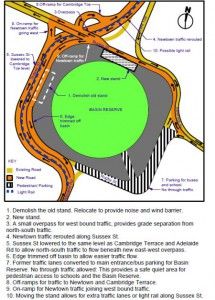
Another plan for avoiding the flyover
- Wellington Scoop
- Accepted from Wellington Scoop features
- Tagged as:
- basin-reserve-flyover
Basin Reserve, Dufferin Street, Mount Victoria, Wellington, Wellington City, Wellington, 6021, New Zealand (OpenStreetMap)
-

